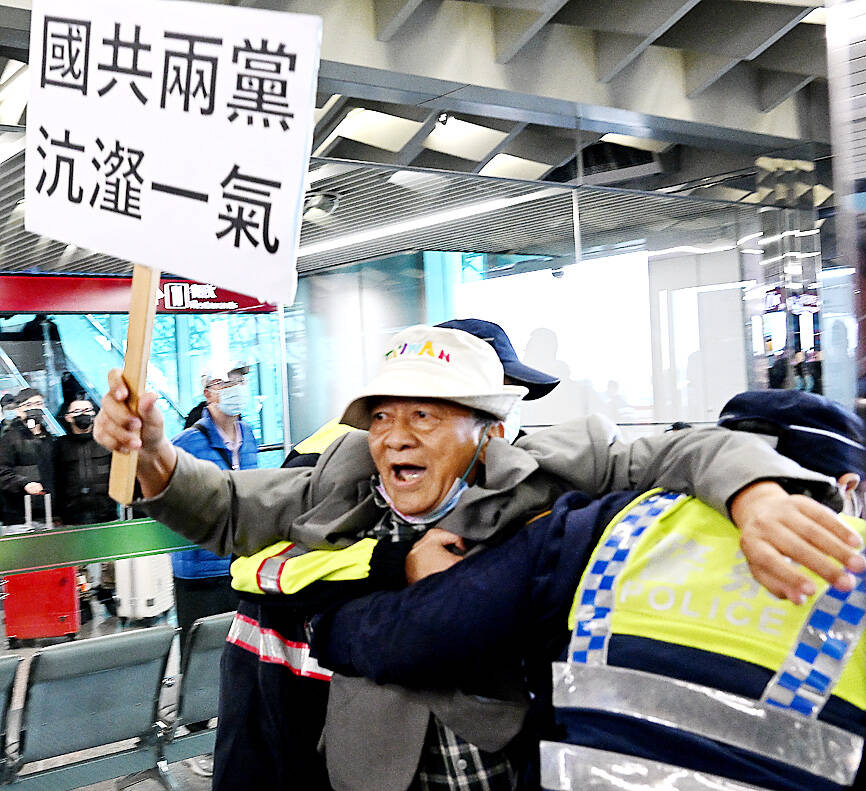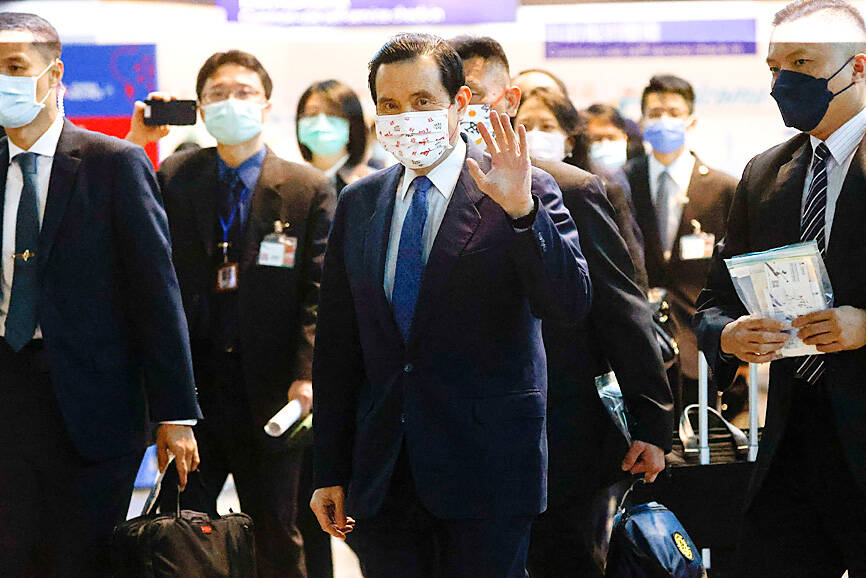Former president Ma Ying-jeou (馬英九) yesterday departed for a 12-day trip to China as scheduled, despite calls for him to cancel the trip after Honduras severed diplomatic ties with Taiwan as an apparent result of China’s dollar diplomacy.
“This is my first trip to China. I was 37 when I began handling cross-strait affairs in the government. Now I am 73 and have waited 36 years for the visit. It is indeed a bit too long, but I am glad I can go,” Ma of the Chinese Nationalist Party (KMT) told reporters at Taiwan Taoyuan International Airport.
“Aside from paying respects to my ancestors, I am taking a group of university students from Taiwan to have exchanges with Chinese university students, which I hope would help ease tensions across the Taiwan Strait and bring peace,” he said.

Photo: Hu Shun-hsiang, Taipei Times
Ma’s office last week said that the former president began planning the trip before the Lunar New Year holiday, but it has been perceived by some as a politically calculated move as President Tsai Ing-wen (蔡英文) is scheduled to depart for a 10-day trip tomorrow to visit two allies in Central America — Belize and Guatemala — via a stop in the US.
Taiwan Republic Office director Chilly Chen (陳峻涵) led a protest against Ma and his delegation at the airport yesterday, as they accused the former president of kowtowing to Beijing and selling out Taiwan.
“Right now many countries are supporting Taiwan and promoting more collaboration, but we see Ma and KMT members choose to stand with Beijing, and boost their links to the evil regimes of China and Russia,” Chen said. “Their action misleads the international community about a perceived close association with China.”

Photo: Ann Wang, Reuters
Democratic Progressive Party spokesman Chang Chih-hao (張志豪) last week said that Ma’s visit might send the wrong signal to the international community regarding China’s “aggressive, expansionist” behavior toward Taiwan.
Chang said that Ma’s trip would fall flat with the public, who would not accept seeing a former president “reduced to serving as a pawn in the Chinese Communist Party’s unification efforts.”
New Power Party (NPP) Legislator Chiu Hsien-chih (邱顯智) yesterday said that everyone would agree that the trip is a politically charged move, and that Ma should know this better than anyone.
“Ma was a Harvard University student when the US ended official ties with Taiwan in 1979. He said that he cried and protested after watching former US president Jimmy Carter make the announcement on TV, as he was uncertain what would happen to Taiwanese students studying in the US at the time,” Chiu said. “Forty-four years later, Ma did not shed any tears when Honduras severed ties with Taiwan because of China’s dollar diplomacy. Instead, he is going to China for his own political interest and to dance to Beijing’s tune.”
As the first former Taiwanese president to set foot in China, Ma should explain whether his office contacted Beijing after obtaining information about Tsai’s trip to Central America, or whether China obtained the information first and was trying to find a “partner” in Taiwan to execute its calculated move, Chiu said.
Additional reporting by Jason Pan

Seventy percent of middle and elementary schools now conduct English classes entirely in English, the Ministry of Education said, as it encourages schools nationwide to adopt this practice Minister of Education (MOE) Cheng Ying-yao (鄭英耀) is scheduled to present a report on the government’s bilingual education policy to the Legislative Yuan’s Education and Culture Committee today. The report would outline strategies aimed at expanding access to education, reducing regional disparities and improving talent cultivation. Implementation of bilingual education policies has varied across local governments, occasionally drawing public criticism. For example, some schools have required teachers of non-English subjects to pass English proficiency

‘FORM OF PROTEST’: The German Institute Taipei said it was ‘shocked’ to see Nazi symbolism used in connection with political aims as it condemned the incident Sung Chien-liang (宋建樑), who led efforts to recall Democratic Progressive Party (DPP) Legislator Lee Kun-cheng (李坤城), was released on bail of NT$80,000 yesterday amid an outcry over a Nazi armband he wore to questioning the night before. Sung arrived at the New Taipei City District Prosecutors’ Office for questioning in a recall petition forgery case on Tuesday night wearing a red armband bearing a swastika, carrying a copy of Adolf Hitler’s Mein Kampf and giving a Nazi salute. Sung left the building at 1:15am without the armband and apparently covering the book with a coat. This is a serious international scandal and Chinese

PERSONAL DATA: The implicated KMT members allegedly compiled their petitions by copying names from party lists without the consent of the people concerned Judicial authorities searched six locations yesterday and questioned six people, including one elderly Chinese Nationalist Party (KMT) member and five KMT Youth League associates, about alleged signature forgery and fraud relating to their recall efforts against two Democratic Progressive Party (DPP) legislators. After launching a probe into alleged signature forgery and related fraud in the KMT’s recall effort, prosecutors received a number of complaints, including about one petition that had 1,748 signatures of voters whose family members said they had already passed away, and also voters who said they did not approve the use of their name, Taipei Deputy Chief Prosecutor

TRADE: The premier pledged safeguards on ‘Made in Taiwan’ labeling, anti-dumping measures and stricter export controls to strengthen its position in trade talks Products labeled “made in Taiwan” must be genuinely made in Taiwan, Premier Cho Jung-tai (卓榮泰) said yesterday, vowing to enforce strict safeguards against “origin laundering” and initiate anti-dumping investigations to prevent China dumping its products in Taiwan. Cho made the remarks in a discussion session with representatives from industries in Kaohsiung. In response to the US government’s recent announcement of “reciprocal” tariffs on its trading partners, President William Lai (賴清德) and Cho last week began a series of consultations with industry leaders nationwide to gather feedback and address concerns. Taiwanese and US officials held a videoconference on Friday evening to discuss the